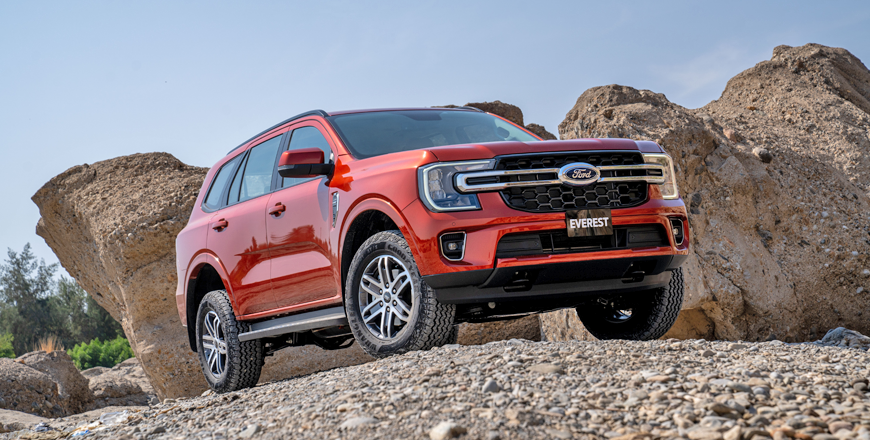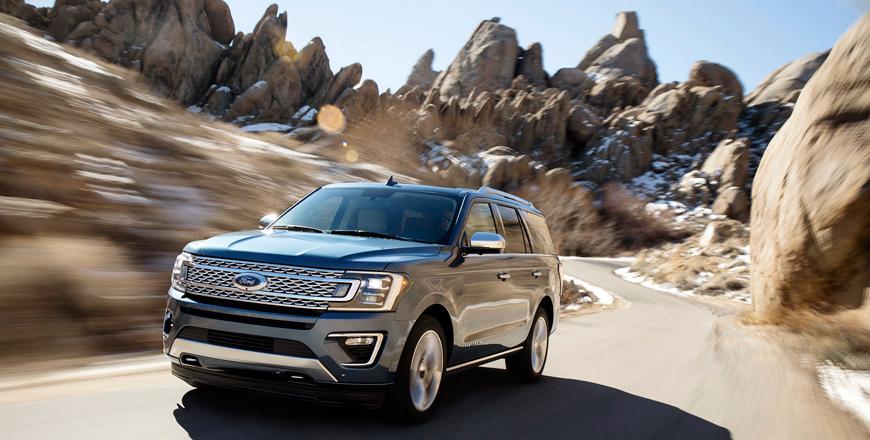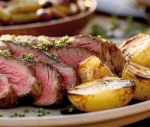You are here
Ford Everest XLT: Summiting the mid-size SUV segment
By Ghaith Madadha - Oct 23,2023 - Last updated at Oct 23,2023

A rugged but refined SUV with plenty of practicality and authentic off-road ability, the Ford Everest may be a well known quantity in Australia, South Africa and other automotive markets, but has finally made its anticipated Middle East debut in its third generation. Bridging the gap between Ford’s luxuriously family-friendly Explorer and dedicated and iconic Bronco off-road SUVs, the Everest’s abilities are many cuts above now popular car-based crossovers, and made its point in a most impressive fashion during a recent and grueling regional launch event test drive in Oman.
Like the Bronco, the Everest is based on a modified version of the same basic platform as the Ford Ranger mid-size pick-up truck, but with its performance, design, equipment, comfort and capability, it punches above many pick-up truck-based would-be rivals. Heavily related to the Ranger at the front, the Everest utilises tough body-on-chassis construction, but adopts a coil-sprung Watt’s link live axle rear suspension set-up in place of leaf springs, for enhanced comfort and handling dynamics. Its integrated wagon-style body is meanwhile expected to provide for improved refinement and rigidity.
Statuesque style
Bearing familial resemblance to the Ranger and other Ford trucks and SUVs with its assertively upright design, including a distinctive and dramatically shark-like fascia with deep mesh pattern grille, heavily browed C-shaped headlights and twin-spoke metallic slats, the Everest oozes a more distinctive style than either “softer” swept back or more bulkily aggressive rivals. Sitting high off the ground and featuring a level waistline, sculpted surfacing, jutting rear spoiler and a visually minimized distance between its wheel-arch apex and bonnet top, the Everest’s statuesque styling sensibility is uniquely sophisticated.
Sitting longitudinally under its muscular and upright dual ridge bonnet, the Everest is driven by familiarly powerful but efficient turbocharged 2.3-litre four-cylinder engine, which also powers the Mustang. Developing 296BHP and 310lb/ft torque at an estimated 5,500rpm and 3,000rpm, respectively, for service here, the Everest’s engine spools up swiftly with near imperceptible turbo lag, and allow for responsively brisk — but unspecified — 0-100km/h acceleration. Confidently versatile through engine speeds and eager to rev to redline, the Everest however draws on a muscularly deep mid-range torque reservoir for effortless overtaking and steep inclines.
Authentic ability
Powering the rear wheels for efficient on-road driving through a slick and quick shifting 10-speed automatic gearbox, the Everest can meanwhile engage its four-wheel-drive system on the move, either through a rotary dial or off-road driving modes, which tailor various parameters for different conditions. With multiple ratios enhancing performance, versatility, refinement and efficiency, its gearbox works like a charm on — and off-road. Intuitively choosing gears, whether blasting up difficult sand dunes or gently cruising through town, it negates the instinct to manually select gears through a less intuitively positioned lever-mounted button.
Fitted with tougher all-terrain 255/65R18 tyres in mid-range XLT specification, the Everest makes short work of various off-road conditions, including river beds strewn with small jagged rocks, and can wade through 800mm of water. Blasting through steeply sloped and side-angled dunes with ease, the Everest’s suspension took the multiple punishing lumps, bumps and dips in its stride, aided by generous off-road angles and 220mm ground clearance. Low ratio four-wheel-drive can meanwhile be engaged for the most demanding low-speed high power situations, and a locking rear differential enhances traction when needed.
Rugged refinement
With its cooling system proving faultless under demanding off-road conditions and heat — even with A/C on full blast — the Everest is however more than just a rugged workhorse, but is also a comfortable and well-mannered long distance express for seven. Smooth and stable at speed for long journeys, the Everest meanwhile proved to be a tidier, more agile and better handling vehicle than expected for its class, height and estimated 2.3-tonne mass. With quick and direct steering, it is eager into corners, with great balance throughout and is grippy when powering out.
Taut through corners and settled over imperfections, the Everest is slightly firm over jagged low speed bumps, but otherwise smooth, comfortable and forgiving. Its cabin is quiet, refined and well-insulated from harshness, while an innovative side mirror design remedies interior wind reverberation. Spacious for front and middle row occupants, its rearmost seats are meanwhile useable and accessible, while its configurable luggage volume is generous. Its cabin is upmarket in ambiance and uncluttered in design, with mostly good materials and extensive standard convenience, infotainment, tech and safety systems, even in XLT specification.
SPECIFICATIONS
Engine: 2.3-litre, turbocharged in-line 4-cylinders
Bore x stroke: 87.55 x 94mm
Compression ratio: 9.5:1*
Valve-train: 16-valve, DOHC
Gearbox: 10-speed automatic
Driveline: Four-wheel-drive, low gear transfer case, locking rear differential
Power, BHP (PS) [kW]: 296 (300) [220] @5,500rpm*
Specific power: 130.7BHP/litre
Torque, lb/ft (Nm): 310 (420) @3,000rpm*
Specific torque: 185.5Nm/litre
Fuel capacity: 80-litres
Length: 4,914mm
Width: 1,923mm
Height: 1,841mm
Wheelbase: 2,900mm
Track: 1,620mm
Overhang, F/R: 871/1,143mm
Ground clearance: 229mm
Water fording: 800mm
Headroom, F/M/R: 1,024/992/925mm
Legroom, F/M/R: 1,057/912/806mm
Shoulder room, F/M/R: 1,450/1,443/1,328mm
Cargo volume, behind 1st/2nd/3rd row: 1,823-/898-/259-litres
Approach angle: 30.4°
Break-over angle: 22.2°
Departure angle: 25.3°
Kerb weight: approximately 2,300kg*
Towing capacity, braked: 3,100kg
Suspension, F/R: Double wishbones / Watt’s link, live axle, coil springs
Steering: Electric-assisted rack & pinion
Turning circle: 11.8-meters
Brakes: Ventilated discs / discs
Tires: 255/65R18
*Estimate
Related Articles
Developed primarily for its biggest market, the latest iteration of Nissan’s behemoth Patrol SUV launched globally in Abu Dhabi last week.
Touted as a giant leap forward for the iconic American manufacturer’s behemoth full-size family SUV offering the new Ford Expedition is the
Twice face-lifted since its introduction in 2011, the first generation Ford Ranger, built on the modern “T6” platform, remains as impressive


















